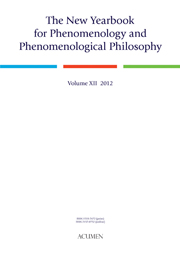Book contents
- Frontmatter
- Contents
- Articles
- Three Levels of Historical Analysis in Early Heidegger
- Heidegger's Schematism of Life and its Kantian Inheritance: A Critical Appraisal
- Husserl's Mereological Semiotics: Indications, Expressions, Surrogates
- Process and Relation: Husserl's Theory of Individuation Revisited
- Mathesis Universalis and the Life-World: Finitude and Responsibility
- Multiplicity, Manifolds and Varieties of Constitution: A Manifesto
- Phenomenology in the United States
- Documents
- In Review
Husserl's Mereological Semiotics: Indications, Expressions, Surrogates
from Articles
- Frontmatter
- Contents
- Articles
- Three Levels of Historical Analysis in Early Heidegger
- Heidegger's Schematism of Life and its Kantian Inheritance: A Critical Appraisal
- Husserl's Mereological Semiotics: Indications, Expressions, Surrogates
- Process and Relation: Husserl's Theory of Individuation Revisited
- Mathesis Universalis and the Life-World: Finitude and Responsibility
- Multiplicity, Manifolds and Varieties of Constitution: A Manifesto
- Phenomenology in the United States
- Documents
- In Review
Summary
Abstract: This paper develops a unified account of our experience of signs, drawing on Husserl's Logical Investigations. It argues that semiotic experience is grounded in mereological experience. Specifically, to experience a as an indication (Anzeichen) of b, we must experience both as parts united within a whole, and to experience x as an expression (Ausdruck) of y, we must experience x as a part of y. Even our experience of signs that have a “surrogative function [stellvertretenden Funktion]” (e.g., numerals) the paper suggests, can be understood mereologically. Thus, Derrida's claim that semiotic experience, for Husserl, fundamentally involves substitution is shown to be incorrect, and a new direction for research into the genesis of semiotic consciousness, and the question of animal and machine language use, is suggested.
Keywords: signs, parts, wholes, indications, expressions, surrogates
Introduction
In their “Evolution of the Genus Homo” anthropologists Ian Tattersall and Jeffrey H. Schwartz claim it is “symbolic consciousness that makes our species,” Homo sapiens, “unique.” The closest they come to defining “symbolic consciousness” is the following.
Human beings alone, it seems, mentally dissect the world into a multitude of discrete symbols, and combine and recombine those symbols in their minds to produce hypotheses of alternative possibilities. (“Evolution,” 83)
- Type
- Chapter
- Information
- Publisher: Acumen PublishingPrint publication year: 2013



